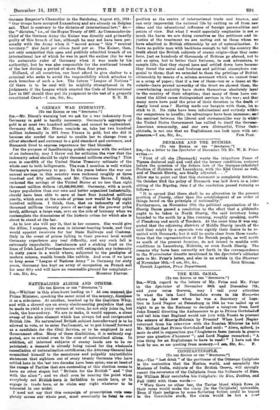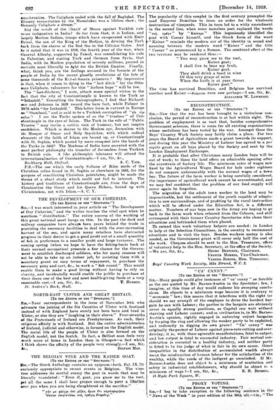CONSTANTINOPLE.
[TO THE EDITOE Or THE " SPEGRATOB.,,"]
Ste,—The "last ditch" of the partisans of the Ottoman Caliphate is the contention that the Moslem world, and especially the Moslems of India, subjects of the British Owen. will strongly resent the severance of the Caliphate from the Sultanate of Ribn. Sir William Muir conclude. his Caliphate; its Rise, Declines and Pall (1891) with these words:—
"Were there no other bar, the Tartar blood which flows in their veins would make the claim [to the Caliphate] untenable. Even if their pedigree by some flattering fiction could be traced to the Coreishite stock, the claim would be but a fee.? anachronism. The Caliphate ended with the fall of Baghdad. The illusory resuscitation by the Mamelakes was a lifeless show; the Osmanly Caliphate a dream."
Did the revolt of the Mutrif of Mecca against Turkish rule rotise indignation in India.? So far from that, it is Indian, and largely Moslem Indian, troops which have co-operated with Emir Feisul, the son of the King of the liedjaz, in driving the Turk back from the shores of the Red Sea to the Cilician Gates. And be it noted that it was in 1918, the fourth year of the war, when General Allenby, supported by Feisul, was consolidating his rule in Palestine, and ousting Turk and German from Syria, that India, with its Moslem population of seventy millions, poured in recruits most liberally to fight for the British Empire. Finally, what, think you, are the feelings aroused in the breasts of the people of India by the recent ghastly revelations of the fate of some thousands of the Kut-el-Amara prisoners ? My impression is that, when it comes to dying in the " last ditch" for the Otto- man Caliphate, volunteers for this "forlorn hope" will be few. The" last-ditchere," I note, attach some special virtue to the tact that the city of Constantinople is known to the Turk as l'Islambill." Consulting the lexicographers, I find that Richard- won and Johnson in 1829 record the bare fact, while Palmer in 1876 adds "for Istambill." This latter form is current in Europe as" Stamboul," and is said to be a Turkish corruption of "ifs r4ir NIA's." I see the Turks spoken of as the " trustees " of Con- stantinople in the eyes of Mani. The Turk in the role of "Public Trustee " may invite a satiric vein of humour, but not inspire confidence. Which is dearer to the Moslem eye, Jerusalem with its Mosque of Omar and Holy Sepulchre, with which radical elements of the faith of Islam are bound up, or Constantinople with St. Sophia, which passed by mere conquest into the hands of the Turks in 1453? The Moslems of India have accepted with the most perfect philosophy the transfer of Jerusalem from Turkish to British rule. A like philosophic tolerance will attend the internationalization of Constantinople.—I am, Sir, lie.,
Beckbury Hall, Shihial. A. C. Iners. P.5.—The use which the early Sultans of Ram made of the Christian relics found in St. Sophia or elsewhere in 1453, for the purpose of conciliating Christian potentates, might be made the theme of a short study which could not fail to interest. The history and traditions of Constantinople are, from the days of Constantine the Great and his Queen Helena, bound up with Christendom, not with Islam.—A. C. Y.







































 Previous page
Previous page